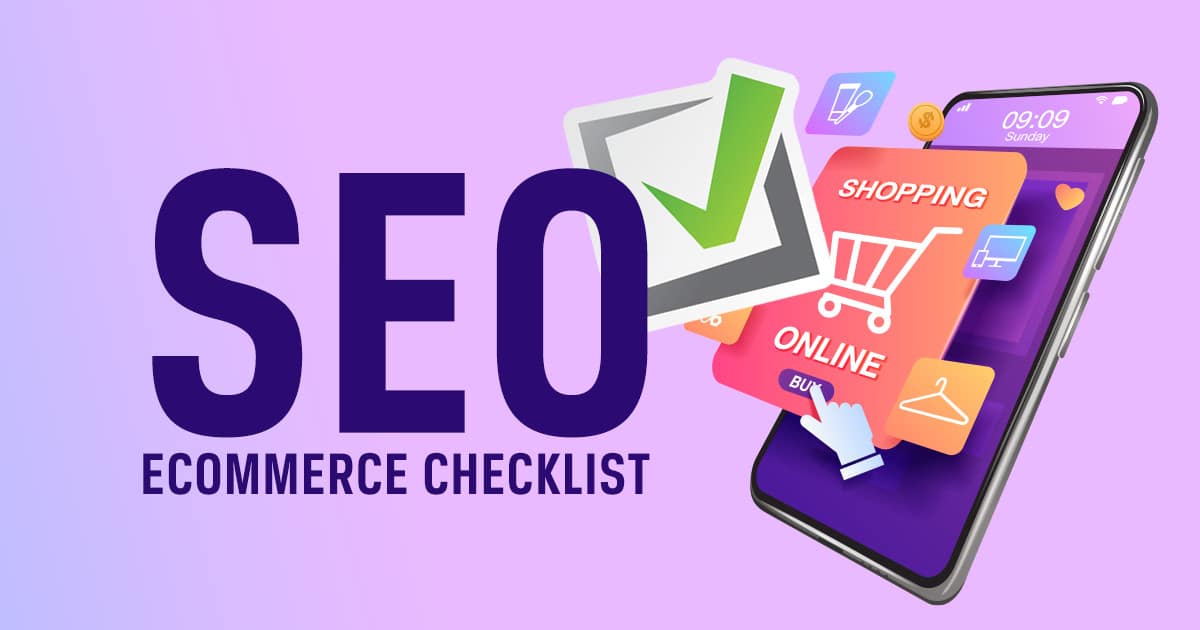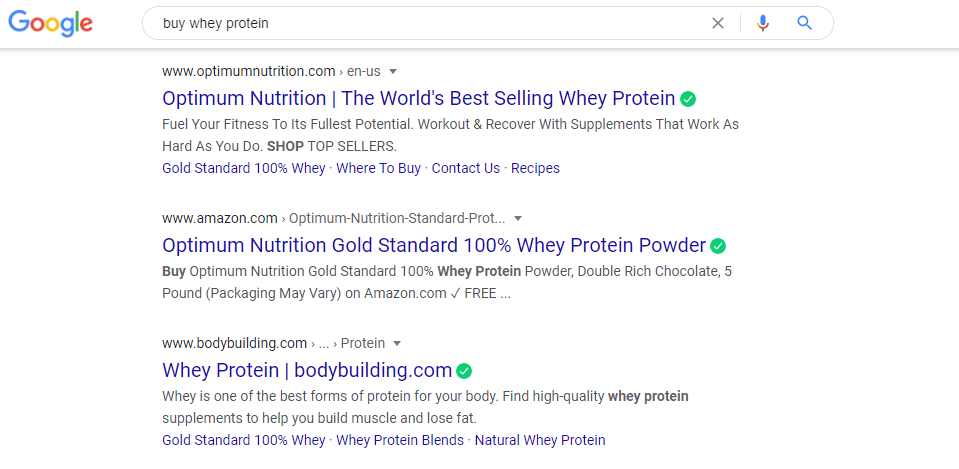Your Ultimate Checklist for SEO on Your Ecommerce Website

We’re living in a bittersweet time for eCommerce websites.
The demand for eCommerce is definitely there and isn’t expected to return to pre-pandemic levels.
During the second quarter of 2020, online sales skyrocketed by 44% from the previous year with $1 of every $5 spent online.
But you didn’t think big-box retailers would ignore the action, did you?
Walmart, Target, and specialty stores have all devoted millions of dollars and thousands of hours to leveling up their eCommerce game. For example, although Walmart had a slow start in eCommerce, they topped expectations in the third quarter with eCommerce sales jumping by 79%.
You have plenty of competition and your work cut out for you with SEO for your eCommerce website.
You need a strategy. Small armies can outsmart and win against the world’s biggest armies and most advanced equipment available – and it’s all due to their passion, tactics, and strategy.
Our SEO consultants at JS-Interactive have helped ecommerce sites boost sales volume by 550%, conversion rates by 218%, and revenue by nearly 500% using the strategies below. This stuff works.
1. Effective Keyword Research for eCommerce SEO
Effective keyword research for eCommerce SEO requires the right mindset and approach. You really must pick your battles.
Major brands have the time, energy, and money to rank in the top spots for high-value keywords. You can win by focusing on your strengths and on their weak points.
Figure Out Which Pages to Optimize First
Pick your best-selling items or high-traffic product listings along with your category pages and begin optimizing those first. Build up from there.
Find Long-Tail Relevant Keywords for SEO on Your Ecommerce Website
A short-tail keyword like “buy whey protein” puts you up against established sites:
Not gonna happen.
Instead, you want to pick long-tail keywords like “Optimum Nutrition sugar-free vanilla protein powder.”
Long-tail keywords have much lower competition yet still decent volume and searcher intent. I like to use SEMrush and KWFinder for keyword research for their extensive database and all-in-one tools.
2. Technical SEO for eCommerce Websites
If your technical SEO isn’t tweaked to Google’s liking, your pages will never show up in search results no matter if you optimize everything else.
Make Sure Search Engines are Crawling and Indexing Your Pages
If Google’s or Bing’s bots aren’t crawling and indexing your individual pages, you won’t show up in search results. Google has an inspection tool to check.
Check Your Website Speed
Speed matters a ton and involves several elements. Google’s algorithms prefer sites that load in less than three seconds. Shoppers won’t stick around on slow sites either.
Ensure Your Website is Mobile Responsive
A mobile version of your site is critical to solid rankings. Google has a tool that will tell you if your content is triggering horizontal scroll or if your links/text are too small.
3. On-Page SEO for Ecommerce Websites
You’re doing yourself a huge disservice if your on-page SEO isn’t cleaned up. These on-page aspects of SEO for eCommerce websites are the next steps after getting your technical SEO in order.
Optimize Meta Data and URLs
Your metadata is the first thing people see in the search results. It’s also some of the top content Google scans as it decides how to rank your product pages. You want to optimize various pieces of metadata for keywords and readability:
- Meta titles and headlines
- Meta descriptions
- H1, H2, and H3 headers
- URLs and slugs – keep them short
Improve Your Product Descriptions
It’s common for eCommerce stores to use the auto-imported or copy/paste description from Amazon or the manufacturer’s website. Don’t. Google wants original content. Spend time rewriting and improving your product descriptions so they’re actionable, interesting, and keyword optimized.
Build Internal Link Structures
Realistically, you don’t need every product page on your website to rank – just the important ones. From there, build internal links between product pages, categories, and other landing pages. Consider each page as a visitor’s stage of the buying process and which links seem the most relevant.
4. Off-Page SEO for eCommerce Websites
Off-page SEO gives your eCommerce website credibility – both in the eyes of Google algorithms and humans.
Optimize Marketplace Listings
Your store’s homepage and individual listings should each be optimized for searches as well using the right keywords, original descriptions, and metadata.
Make sure that you have your products listed on all the relevant marketplaces and you’re linking to your website here as well: Amazon, Google Shopping, Facebook Shopping, Instagram Shopping, eBay, etc.
Rework Local Listings
Even if you deal strictly with eCommerce, you should still optimize your local business listings on sites like Google Maps. These listings show that you’re a legitimate business and not some shady fly-by-night operation.
Build Respectable Backlinks
Backlinks show search engine bots that your site is worth sharing with others. It helps you build trust and authority in the eyes of both Google and shoppers – two critical components of successful SEO for eCommerce websites.
Google also judges your website based on the authority of the sites pointing to yours. Backlinks should only come from high-quality trustworthy websites and they must be earned through quality content – not forced or bought.
5. Online Reputation and Brand Monitoring
Ultimately, your goal of SEO for your eCommerce website is to earn the attention, trust, and business of shoppers. Whether search engines take the stuff below into strong consideration isn’t even worth the debate because they matter tremendously to customers.
Build Google and Third-Party Reviews
Reviews show that your products live up to the hype. 84% of people trust online reviews as much as a personal recommendation. To succeed online, you must encourage shoppers to submit reviews and user-generated photos. User photos build trust because they show you have nothing to hide and your professional site photos are accurate.
Hone Your Social Media Presence
Like reviews, social media also shows that you care about the experience your eCommerce site provides. It gives you a chance to interact with your audience and encourage engagement. Google doesn’t say whether social media activity is an SEO factor but Bing is clear that it matters.
6. SEO-Driven Content Marketing for Ecommerce Websites
Google’s bots need to see that you’re a respected authority in your industry if you want to rank well. Likewise, content that truly resonates with your audience segments (and doesn’t exist solely to promote products) is key.
Create Relevant and Interesting Content
People underestimate the impact that comprehensive content has on SEO for eCommerce websites. Your online presence is all you have to boost traffic and authority. Content in line with Google’s EAT – Expertise, Authority, Trust – is critical for showing Google why you deserve to rank well for your terms.
Content must be relevant to your audience and not promotional. Focus on what you know – your expertise – and use it to help people solve problems and improve their lives. Rankings will eventually follow.
Don’t Neglect Video and Multimedia
Video and image content with optimized ALT descriptions and captions can help you rank for high-volume terms because the competition is a little less stiff.
I’ve noticed a lot of clients can get themselves ranking on the first page of image or video results even for short keywords when they devote time to the SEO and content.
Start Improving the SEO on Your Ecommerce Website with an Expert Consultant
You can’t outrank the best without a well-researched strategy. At JS-Interactive, our SEO consultants have the time, expertise, and knowledge to develop the strategy your eCommerce site needs to succeed in your niche. Our experts understand all the little details behind every winning eCommerce website and we’d love to bring our skills to your site and watch you succeed.
Let’s talk about your current SEO strategy and long-term goals on a 30-minute call with an SEO consultant. It’s entirely free and we’ll never pressure you into anything.

